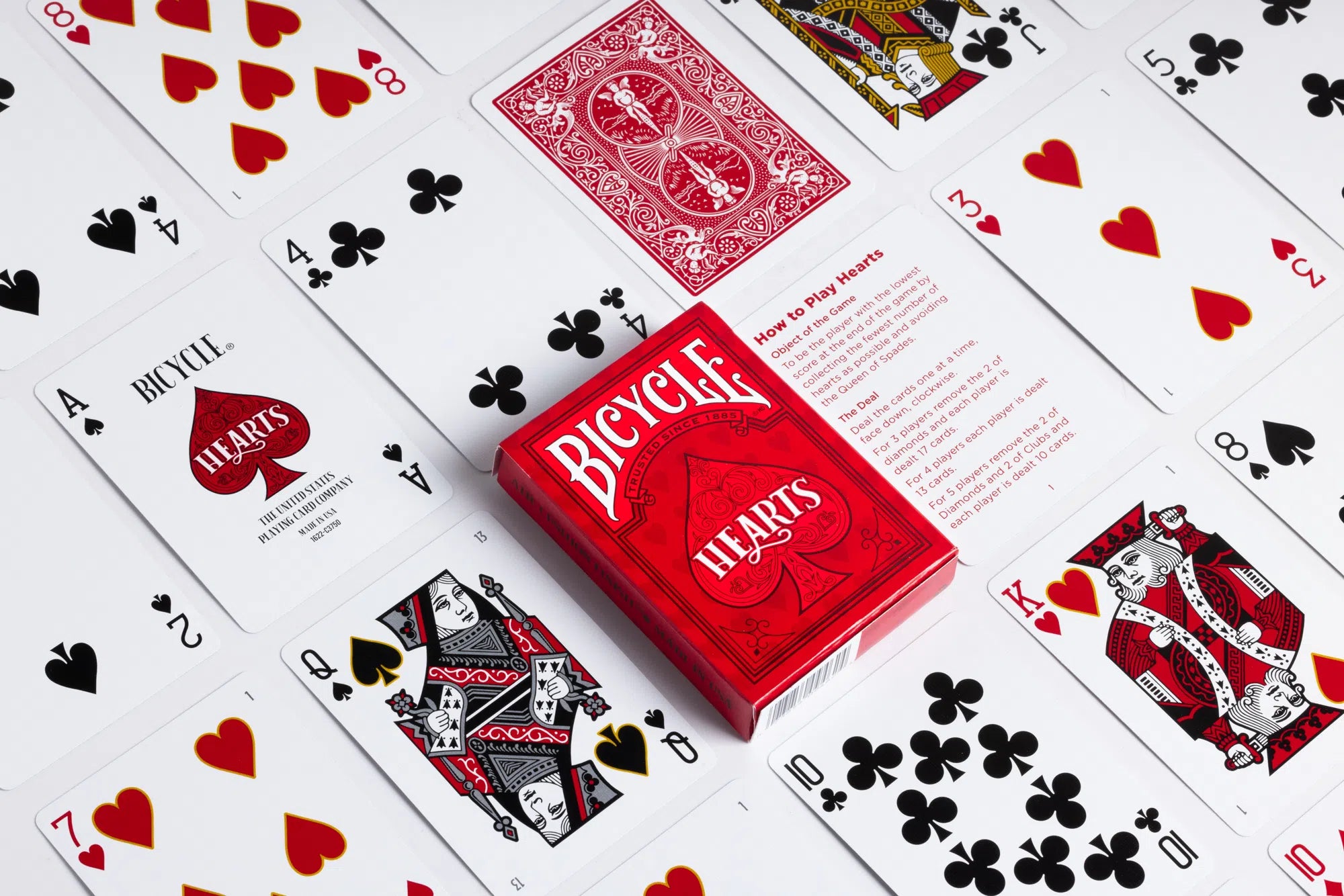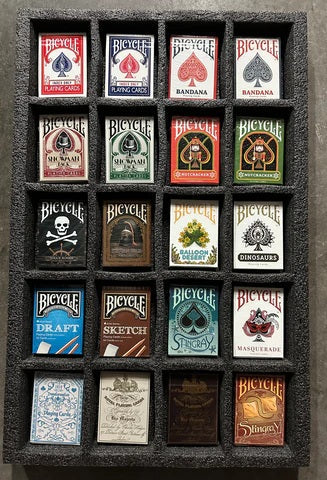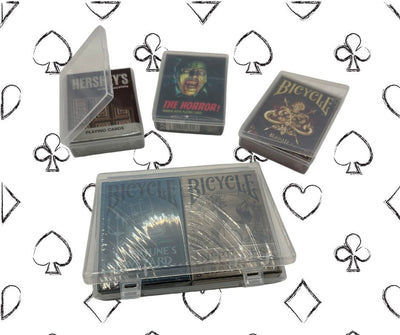
(All of the penalty cards in a game of Hearts)
Card Game Rules
Hearts is a trick taking game that requires 4 players and a standard 52 playing card deck with Aces high and 2’s low. The objective of the game is to have the fewest points when someone reaches 100 points.
For other trick taking games, see our guides for Spades and Euchre.
If you are looking for cards to play Hearts with, check out a standard pack here or one of our more recent arrivals here.
Set Up
Before game play can begin, a dealer must be selected. Each player draws one card from a shuffled deck. The player with the lowest card becomes the dealer. The dealer shuffles the deck and passes out 13 cards clockwise to each player.
How to Play
The player with the 2 of Clubs always makes the first lead starting with that card. Moving to the left of the 2 of Clubs, players must follow suit and try to out rank the cards in play. If they cannot follow suit, then any card may be played with the lead suit trumping others. If, on the first trick, a player does not have any Clubs to match the 2, they neither can play any Hearts nor the Queen of Spades. The winner of the trick goes first in the next round.
Scoring
When all cards are played, players examine their tricks won and count the Hearts and the Queen of Spades. Hearts are worth 1 point each and the Queen of Spades is worth 13 points. Players want to avoid wining tricks with Hearts and the Queen of Spades as much as possible. If, however, a player wins all of the Hearts and the Queen of Spades in the game, the player “Shoots the Moon” and receives no points while all other players receive 26 points.
For more information on the rules of Hearts and its variations, check out pagat's article on the game here
A free online version of Hearts may be found here
History

(Hearts as it appears in Windows 7)
The history of Hearts begins with the 18th century Spanish game of Reversis. Reversis contained many elements now seen in modern day Hearts such as penalty points for tricks gained and additional points for certain cards like the Queen of Hearts. By 1850, rules were added and modified; Hearts became the penalty card; the Queen of Spades became the specialty card etc. According to card games scholar David Parlett, Hearts first came to America around the 1880’s. It then became very popular among grade school students. By the late 20th century, Windows Operating System popularized the game even more by uploading a digital version of the game on their software.
For more information on the early history of Hearts, check out David Parlett's article here
Variations
Passing
Some variations allow for passing. Passing occurs before the lead card is placed at the beginning of the turn and creates an extra layer of complexity in the game and allows for more strategy for players to use. If the game allows for passing, players will select 3 cards they would like to get rid of before each turn begins. The direction of the pass changes in cycles of 4. On the first turn, players will pass their three cards to the person to their left; on the second turn, players will pass their three cards to the person to their right; on the third turn, players will pass their three cards to the person in front of them; and, on the fourth turn, no passing occurs. Typically, players want to get rid of high ranking Hearts and the Queen of Spades as those cards will most likely win the player a trick and gain them points.
Two Player Hearts
Two people may play Hearts with an alteration to the deck. In Two Player Hearts, 3's, 5's, 7's, 9's, Jacks, and, Kings are removed from the deck, leaving 13 cards to be dealt to each player. All general rules remain the same.
Omnibus Hearts
Omnibus Hearts incorporates the 10 of Diamonds. In Omnibus, if one wins a trick that contains the 10 of Diamonds, 10 points are subtracted from their score. Subsequently, for one to Shoot the Moon, a player must win all of the Hearts, the Queen of Spades, and the 10 of Diamonds. Shooting the Moon in Omnibus Hearts results in either a subtraction of 36 points to their own score or an addition of 26 points to everybody else’s score. The shooter decides which option best advances their play.
Cancellation Hearts
Cancellation Hearts is a version of Hearts for large amounts of players, typically 5-11. In Cancellation Hearts, 2 packs of cards are in play. Because there are doubles of every card, a new strategy of cancellation emerges. If a pair of cards is played, they cancel each other out in trick ranking but, still count as points. So, if both Ace of Hearts are played, the next highest card wins the trick but, the winner still takes two points for the Hearts. If 2 pairs of any card are in play, the trick is voided and cards are given to the winner of the next trick. In Cancellation Hearts, a common strategy is to pair up the Queen of Spades so that the winner of the trick gets a devastating 26 point addition.
The following illustrates the various deals for each number of players:
For 5 players, one Joker is added, 21 cards are dealt to each player, and the Joker leads the game. For 6 players, a 2 of Clubs, and a 2 of Diamonds are removed, 17 cards are dealt to each player and the remaining 2 of Clubs leads the game. For 7 players, a Joker is added, 15 cards are dealt to each player, and the Joker leads. For 8 players, a Joker is added, a 2 of Clubs is removed, 13 cards are dealt to each player, and the Joker leads. For 9 players, a 2 of Clubs, both 2 of Diamonds, and both 2 of Spades are removed, 11 cards are dealt to each player, and the 2 of Clubs leads. For 10 players, a 2 of Clubs, both 2 of Diamonds, and a 2 of Spades are removed, 10 cards are dealt to each player and the 2 of Clubs leads. Finally, for 11 players, a 2 of Clubs, both 2 of Diamonds and both 2 of Spades are removed, 9 cards are dealt and the 2 of Clubs leads.
The Joker is treated as a Zero of Clubs.
Looking for more card games to play? Check out this article:
40+ Great Card Games For All Occasions
About the author: John Taylor is a content writer and freelancer through the company Upwork.com. You may view his freelancing profile here. He has a B. A. in English, with a specialty in technical writing, from Texas A&M University and a M. A. in English from the University of Glasgow. You may view his previous articles about card games here and his LinkedIn profile here.






10 comments
What happens as a player when it’s your turn and you have not matching suit or matching card to play. What are the options?
Is there a strategy in knowing which cards to pass
There is no other reference to breaking hearts. For over 40 years I have played, if the QoSpades is played, hearts are broken. Some computer games won’t allow a heart to be played unless there is no choice.
So a player is prohibited from playing heart in the first hand if he does not have a club. What if that player was dealt 13 hearts? It could happen.
And then after playing one hand, we realized that with only 2 people you know immediately after the deal what cards the other person is holding and strategy is almost useless. Badge for 2 people!